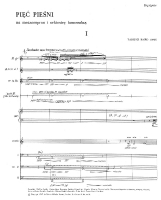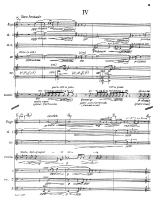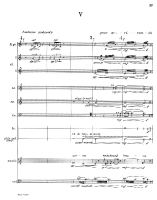Five Songs for mezzo-soprano and chamber orchestra to words by Halina Poświatowska. Halina Poświatowska in memoriam (1968)
I. Parting is a bird (Andante non troppo); II. Share with me (Allegro agitato); III. God, have mercy on me (Adagio); IV. I’m cutting an orange of pain (Poco Andante); V. Whenever I want to live, I scream (Andante moderato).
Each song follows the structure of the text – the number of vocal-instrumental phrases corresponds to the number of poetic verses. Purely instrumental presentations occur in linking fragments, and in fragments opening and ending each song. A modest orchestral line-up is further reduced in successive songs. The composer treats the voice traditionally and uses the Sprechgesang and parlando technique. The organisation of the sound material suggests a dodecaphonic order, but it is based not on twelve-note series but on eight-, ten- and twelve-note “rows”.
The cycle is characterised by three equal elements: rudiments of dodecaphonic thinking in a linear progression, varied sound emphasising the work’s emotional narrative (ascetic and delicate notes as well as sharp and aggressive ones), and expressionist nature of the music resulting from the choice of the poems.
Baird’s composition is the most subtle and delicate piece in his entire oeuvre. The moving expression of this very personal tale of human longing for a life in love stems from the composer’s personal involvement:
It is a work close to me really because of non-musical reasons and is associated with the story of my relations with an outstanding poet and woman, who died young and whom I never met personally, because death intervened, and to whom at some point in my life [...] I felt closer than to many people I really knew.
Already within a year of its premiere the work rose to international fame; it was presented in, among others, Dresden, Madrid and Yerevan. In 1970 the song cycle won the composer the State Prize, 1st class.









